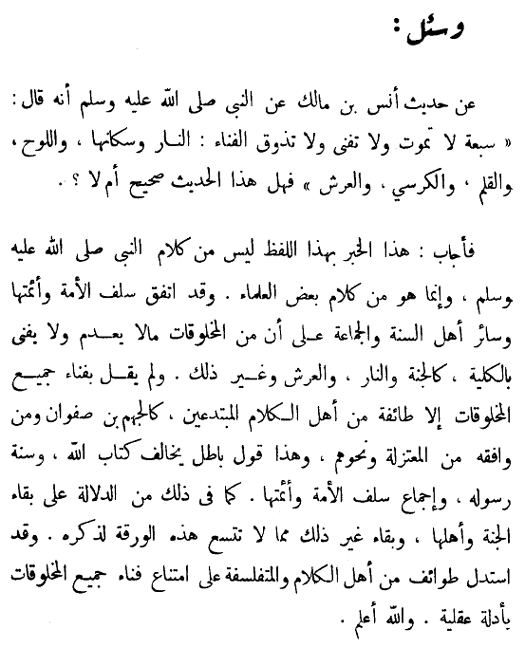IbnTaymiyyah.Com
Posted by Abu.Iyaad on Tuesday, August, 16 2011 and filed under Doubts and Misconceptions
Key topics: Hellfire

The Saying that the Hellfire is Eternal Is Plentiful and Abundant in the Works of Ibn Taymiyyah and He Refutes the Contrary View
An example of that is the saying of Shaykh al-Islaam Ibn Taymiyyah in response to a question (Majmu' al-Fatawa 18/307):

And he was asked: About the hadeeth of Anas bin Malik from the Prophet (sallallaahu alayhi wasallam) that he said, "Seven never die, never perish and never taste perishment. The Hellfire, its inhabitants, the Preserved Tablet, the Pen, the Kursee, and the Arsh", is this hadith sahih (authentic) or not?
So he replied: This narration with this wording is not from the speech of the Messenger (sallallaahu alayhi wasallam), but it is from the speech of some of the Scholars. And the Salaf of the Ummah and its leading scholars, and all of Ahl al-Sunnah wal-Jamaa'ah are agreed that there are from the created things those which will not cease to exist, and will never entirely perish, such as Paradise and Hellfire, the Throne and other than that. And none spoke of the expiration of all of the created things except a faction from the innovating Ahl al-Kalaam, such as al-Jahm bin Safwan and whoever agreed with him from the Mu'tazilah and their likes. This saying is futile, it opposes the Book of Allaah and the Sunnah of His Messenger and the consensus of the Salaf of this Ummah and its leading scholars. Just as there is evidence in that of the eternity of Paradise and its inhabitants, and the eternity of other than that which this page does not suffice for it to be mentioned. Some of the factions of Ahl al-Kalaam and the Mutafalsifah have argued for the impossibility of the expiration of all created things using rational evidences. And Allaah knows best.
Comments
Regarding the mention of al-Jahm bin Safwan, he spoke of the expiration of all created things because he was operating upon the principle that an endless chain of events (tasulsul) is impossible in both the past and the future. Al-Jahm (and Abu al-Hudhayl al-Allaaf al-Mu'tazilee who said all motion will cease) were both consistent in this regard, and this matter is connected to their proof to demonstrate the universe is originated (huduth al-ajsaam) which has its origins in the Hellenized Sabean Philosophers through whom it entered into the Muslim Ummah. The Ash'arites and Maturidis contradicted themselves by allowing an endless chain of events in the future but not in the past. The saying of (إمتناع الحوادث لا أول لها), an endless chain of events in the past is impossible, is the foundation upon which al-Jahm bin Safwan founded all of his ta'teel of the attributes of Allaah, the Exalted, and all of the Ahl al-Kalaam, the Mujassimah amongst them (Rafidah, Karraamiyyah) and the Mu'attilah amongst them (Jahmiyyah, Mu'tazilah, Kullaabiyyah, Ash'ariyyah, Maturidiyyah) all operate upon this premise (refer to this article).As for Ahl al-Sunnah they say that Allaah has eternally been the doer of whatever He wills, and thus He has eternally been one who speaks if He wills, acts if He wills, creates if He wills, provides if He wills and so on. This means there is no end to Allaah's speech and action in the past or the future. Resulting from this is the saying that it is permissible (yajuz) for their to be an endless chain of events (meaning here things Allaah creates or brings about) in the past and the future, with each and every single one of these events or entities being preceded by it's own non-existence. Thus, there is nothing besides Allaah that is eternal along with Him, and this also falsifies the view of the Philosophers that the universe is eternal along with Allaah and is necessary to His existence. But when the Ahl al-Kalaam began to operate upon their false premise (إمتناع الحوادث لا أول لها), and endless chain of events is impossible, they were forced to deny Allaah's attributes and actions and His will, choice - to varying degrees - in order to remain consistent with their proof for the universe being originated and having a creator. The Jahmiyyah, even though most misguided, were intellectually more honest in sticking to the binding necessities of this proof. As for the Ash'aris and their likes, they fell into great contradiction and intellectually incoherent, despite not being as misguided in the actual views they held. For more information on this subject please visit Asharis.Com.